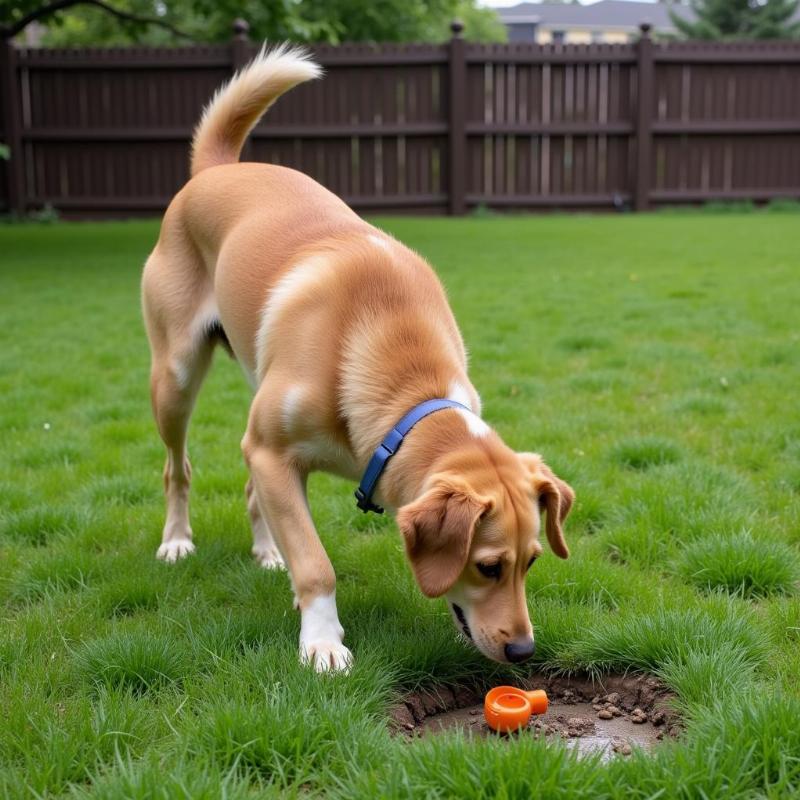A dog refusing to eliminate can be frustrating and concerning. Whether your furry friend is suddenly holding it in or has developed a new aversion to their usual potty spot, understanding the underlying cause is crucial for addressing the issue effectively. This guide delves into the common reasons behind bathroom avoidance in dogs and offers practical solutions to help your pup get back on track.
Medical Reasons Your Dog Might Be Avoiding the Bathroom
Several medical conditions can contribute to a dog’s reluctance to urinate or defecate. Urinary tract infections (UTIs), bladder stones, constipation, and even arthritis can make the process painful, leading your dog to associate the bathroom with discomfort.
If your dog exhibits other symptoms like straining, whimpering, frequent squatting with little to no output, blood in their urine or stool, or changes in appetite and behavior, a veterinary check-up is essential.
Behavioral Reasons for Bathroom Avoidance
Sometimes, the reason behind bathroom avoidance is purely behavioral. A change in environment, such as moving to a new home, can disrupt a dog’s routine and make them hesitant to relieve themselves. Stress, anxiety, and fear can also play a role. For instance, loud noises like thunderstorms or fireworks might scare your dog away from their usual potty spot.
House-Training Issues and Solutions for Bathroom Avoidance
Incomplete or inconsistent house-training can contribute to bathroom avoidance. If your dog wasn’t properly taught where to eliminate, they might develop a preference for eliminating indoors. Similarly, if accidents weren’t cleaned thoroughly, lingering odors can encourage repeat offenses.
Establish a regular potty schedule, taking your dog out at predictable times, especially first thing in the morning, after meals, and before bedtime. Reward successful potty breaks with praise and treats. If accidents happen, clean the area thoroughly with an enzymatic cleaner to eliminate the scent.
Creating a Comfortable Potty Environment for Your Dog
Your dog’s potty area should be a safe and comfortable space. If the designated area is exposed to harsh weather, loud noises, or distractions, your dog might be reluctant to use it. Ensure the area is clean, accessible, and relatively private.
 Dog happily relieving itself in the designated potty area
Dog happily relieving itself in the designated potty area
When to Seek Professional Help
If your dog’s bathroom avoidance persists despite your efforts, it’s important to consult a veterinarian or a certified dog trainer. They can help determine the underlying cause and develop a tailored training plan. They can also rule out any underlying medical conditions and address behavioral issues contributing to the problem.
Conclusion
Understanding why your dog won’t go to the bathroom requires careful observation and addressing potential medical and behavioral factors. By creating a comfortable potty environment, reinforcing positive potty habits, and seeking professional help when needed, you can help your furry friend get back to a healthy bathroom routine.
FAQ
- Why is my dog suddenly refusing to pee outside? Sudden changes in behavior can be due to medical reasons, stress, or environmental factors.
- How can I encourage my dog to use their designated potty area? Establish a consistent routine, reward successful potty breaks, and ensure the area is clean and comfortable.
- Could my dog’s bathroom avoidance be a sign of a UTI? Yes, it could be. Other signs include straining, frequent squatting, and blood in the urine.
- When should I contact a vet about my dog’s bathroom habits? If the issue persists, is accompanied by other symptoms, or if you suspect a medical issue, contact your vet immediately.
- How can a dog trainer help with bathroom avoidance? A trainer can identify behavioral issues and develop a tailored training plan to address the problem.
- Is it normal for a dog to hold their bladder for a long time? While dogs can hold their bladder, prolonged holding can lead to medical issues.
- Can anxiety cause a dog to avoid the bathroom? Yes, stress and anxiety can disrupt a dog’s normal routine, including their bathroom habits.
dog won’t stop barking in crate
why wont my dog leave me alone
dog won’t leave my side
dog constantly barking in crate
why won’t my dog go to the bathroom outside
Beautdogs.us is your premier resource for all things dog-related in the US. We offer expert advice on dog breeds, care, and products, catering to both new and experienced dog owners. From understanding why your dog won’t go to the bathroom to finding the perfect breed for your lifestyle, Beautdogs.us provides comprehensive and reliable information. Contact us for personalized support at [email protected] or call us at +1 501-555-7529. Let Beautdogs.us be your trusted companion on your dog ownership journey.